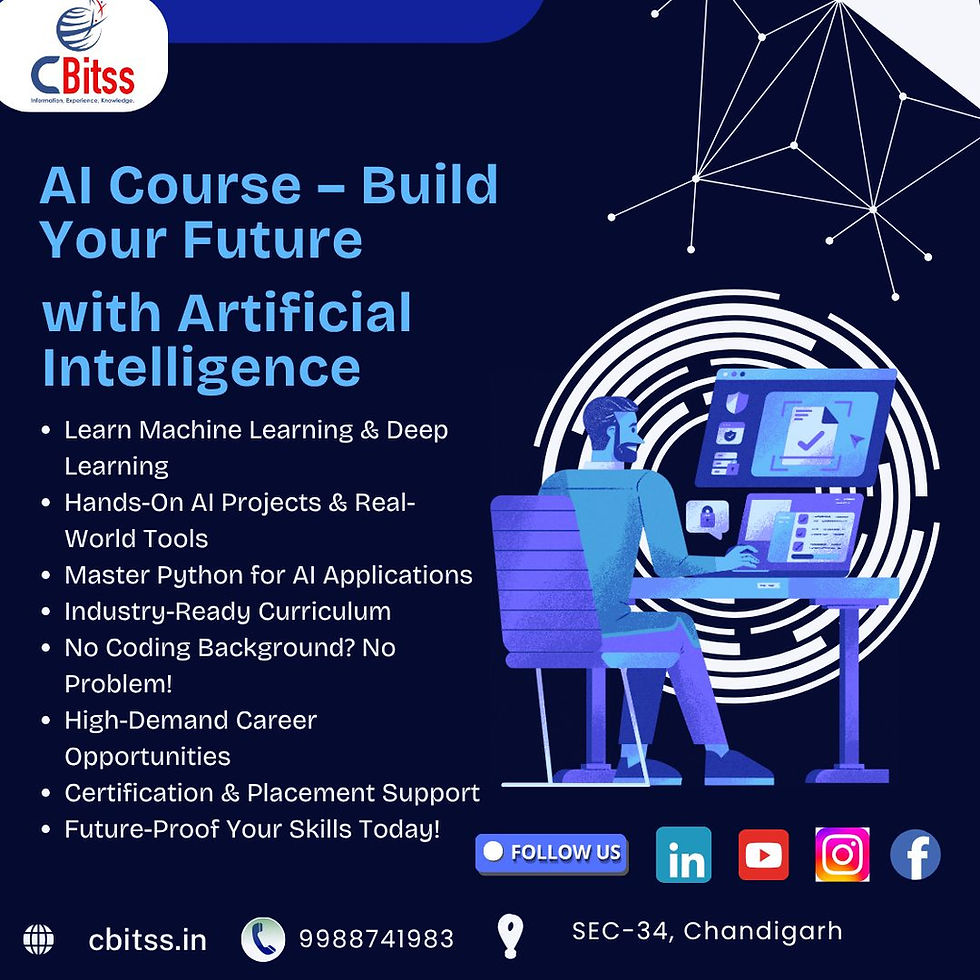Top-Rated AI Course to Master Machine Learning & Beyond
- Sandeep Jamwal
- Aug 7, 2025
- 4 min read
Updated: Aug 21, 2025
Introduction
Artificial Intelligence (AI) is no longer just a futuristic concept—it’s a key part of today’s digital landscape. From personalized recommendations and smart assistants to self-driving cars and automated diagnostics, AI is transforming every industry. As this field grows, so does the demand for professionals skilled in AI and machine learning (ML).
This blog explores how a top-rated AI course can help you develop the skills to thrive in this dynamic domain—whether you're a student, tech enthusiast, or working professional.

Why Learn Artificial Intelligence Today?
AI is embedded in daily technologies such as voice search, email filters, facial recognition, and predictive analytics. Organizations across sectors like healthcare, finance, marketing, logistics, and manufacturing are adopting AI to improve efficiency and decision-making.
Key reasons to pursue AI training:
High demand for AI experts globally
Attractive salary packages and career growth
Opportunity to work on cutting-edge technology
Wide range of career options: AI Engineer, Data Scientist, ML Engineer, etc.
Learning AI opens the door to a future-ready career with impactful work and global relevance.
What You’ll Learn in an AI Course
A quality AI course offers more than just theory—it gives you hands-on experience with real-world applications. Here's what a typical course may cover:
1. Introduction to AI & Machine Learning
Basics of AI, ML, and Deep Learning
Understanding supervised, unsupervised, and reinforcement learning
Key terminologies and concepts
2. Programming Foundations
Python for AI
Libraries such as NumPy, Pandas, and Matplotlib
Writing algorithms for classification, regression, and clustering
3. Machine Learning Algorithms
Linear and logistic regression
Decision trees and random forests
Support vector machines and k-nearest neighbors
4. Deep Learning & Neural Networks
Introduction to deep learning
Working with TensorFlow and Keras
Building and training neural networks
5. Natural Language Processing (NLP)
Text classification and sentiment analysis
Chatbots and speech recognition
6. Computer Vision
Image recognition and object detection
Applications in security, healthcare, and automation
7. Projects and Case Studies
Real-world applications across industries
Capstone projects to demonstrate skills
Benefits of Enrolling in a Top-Rated AI Course
Structured Learning
A professional course offers a step-by-step curriculum that builds skills progressively, from basics to advanced topics.
Hands-On Experience
Courses often include labs, coding exercises, and projects, which help you apply concepts and prepare for real-world tasks.
Expert Guidance
You learn from experienced instructors who provide insights, feedback, and mentorship to accelerate your learning journey.
Career Support
Many courses offer resume building, interview preparation, and career counseling to help you land AI-focused roles in the industry.
Who Can Join an AI Course?
Contrary to popular belief, AI is not limited to data scientists or programmers. If you have a logical mindset and a willingness to learn, you can pursue AI training.
Ideal candidates include:
Students & Graduates of Computer Science, Engineering, or Math
Working Professionals in IT, analytics, or software development
Entrepreneurs & Innovators interested in AI-powered solutions
Career Switchers from related technical or analytical backgrounds
Prior experience in coding (especially Python) is helpful but not always mandatory, as many beginner-friendly AI courses start from scratch.
Careers After AI Course Completion
Once you've mastered the foundations, you can explore a variety of job roles, including:
AI Engineer
Machine Learning Engineer
Data Scientist
NLP Specialist
Computer Vision Engineer
AI Research Assistant
Business Intelligence Analyst
These roles are not only well-compensated but also at the forefront of innovation, offering both creative and technical challenges.
The Future of AI Careers
AI is here to stay—and it’s evolving quickly. Professionals with skills in machine learning, deep learning, and AI implementation are becoming invaluable across every sector.
Governments, startups, and multinational companies are investing in AI-based projects, creating an ecosystem full of opportunity. Keeping up with AI advancements through continuous learning is vital to remain competitive.
Final Thoughts
A top-rated artificial intelligence course in Chandigarh your gateway to a future-oriented, high-impact, and intellectually rewarding career. By learning the fundamentals of machine learning, deep learning, and intelligent systems, you’ll be ready to solve real-world problems and be part of the AI revolution.
Whether you're just beginning or looking to advance your technical career, now is the perfect time to invest in AI education and shape your future in one of the most exciting fields of the 21st century.
Q1: Why is Artificial Intelligence such a crucial skill today?
Answer: AI is rapidly transforming industries by automating tasks, improving predictions, and enhancing decision-making. Learning AI empowers you to stay relevant in a digital-first job market and work on real-world problems using cutting-edge tools.
Q2: What will I learn in a top-rated AI course?
Answer: A structured AI course teaches you how to build smart systems using machine learning and deep learning. You’ll gain hands-on experience with tools like TensorFlow, Keras, and Python, preparing you for AI roles across industries.
Q3: Do I need a tech background to join an AI course?
Answer: No. While having some familiarity with math or programming helps, many top-rated courses start from the basics and guide you step-by-step. A logical mindset and curiosity are often all you need to get started.
Q4: What career opportunities are available after AI training?
Answer: Post-training, you can pursue roles such as AI Engineer, NLP Specialist, Data Scientist, or Computer Vision Developer. These careers offer competitive salaries and the chance to work on innovative, future-oriented projects.
Q5: How is an AI course different from self-learning online?
Answer: While self-study works for some, an expert-led course ensures you gain practical, job-ready skills in a shorter time. You also benefit from peer learning, feedback, and certifications that boost your resume.






Comments